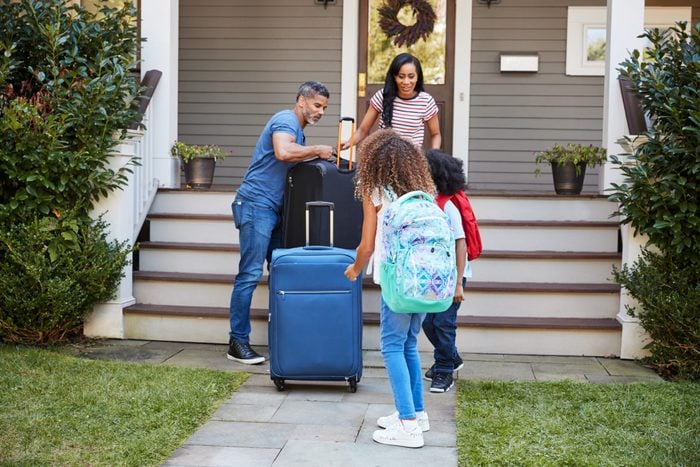Here’s How to Spot an Airbnb Scam

Airbnb scams can really ruin your vacation, but there are some reliable ways to spot one.
Whether you want to head for the mountains, beach, or an exciting new city for your vacation, Airbnb provides a great way to live amongst the locals and enjoy the comforts of a home (and kitchen!).
However, as the Airbnb business has gotten more and more popular with travelers, it has also gotten more popular with scammers. Airbnb scams can take many forms, from last-minute listing switches due to “plumbing problems,” to photos bearing no resemblance to the room when you arrive.
Fortunately, in November of 2019, Airbnb rolled out a security update and guest guarantee to verify guests and hosts and try to limit the possibility that their users could have a bad experience. But with over seven million listings on Airbnb worldwide, even if you think you know the signs you’re about to fall for a bad Airbnb listing, you can’t be too careful.
Before you leave for a vacation, it’s important to know we’ve outlined the most common indications of Airbnb scams below, and the actions you can take when you feel like something just isn’t right.
On This Page
Pictures Look too Good to Be True
Sometimes it’s obvious that photos have been manipulated (think: Photoshopped, flipped, or digitally furnished, with edges that don’t match up or bizarre perspectives or shadows) and sometimes it’s not. Using fake photos is a classic Airbnb scam.
If the details of the listing—say, a reasonable price and a central location—seem too good to be true when combined with photos that look like they could be on the cover of Architectural Digest, it’s worth taking a minute to reverse-Google-image-search to make sure they’re not stock photos or stolen from somewhere else before renting a property on Airbnb.
To do so, go to images.google.com and click the camera icon on the right-hand side to upload one of the listing’s photos (or simply drag it into the search bar). If the photos can be found on any other website, they will show up, and you may have dodged a bullet—or scored a bargain!
The Reviews Are Bad (or Missing)
If a listing seems nice and has no reviews, don’t despair: new listings are not uncommon, and it takes time to build up a good hosting reputation on a site like Airbnb. So a review-less listing isn’t necessarily an Airbnb scam.
Clicking the price button at the top of the search results will tell you the average nightly price for properties in that location on the dates you’re searching for, so you can see if the price is right. You can also check to see if the host’s identity has been verified by Airbnb (click on their profile to find out). Scammers are unlikely to submit their real government IDs, email addresses, and phone numbers, so if someone’s been verified it’s a good sign. If you still have suspicions, it’s always worth Googling a host if you can.
However, if reviews are present, it’s always worth reading a page or three. Bad reviews or even just reviews that mention personal dealbreakers (such as being in a busy nightlife area) are important information to have.
The Reviews Are too Good
Conversely, there’s the situation where multiple good reviews appear in a row, all with similar wording or less-than-perfect English. While it could simply be international travelers leaving their multi-lingual thoughts, several identical glowing reviews could also be an indication of a classic Airbnb scam listing with fake reviews.
However, if the reviews are nothing but positive and the hosts’ profile has a Superhost badge, it’s a listing you can trust. To maintain Superhost status, hosts have to have had a minimum of 10 stays in the past year, a cancellation rate of less than 1 percent, consistently high ratings (over 4.8 out of 5 stars), and have a 90 percent response rate to new messages within 24 hours. Trust your intuition, and carry out the other action steps (such as checking the photos) to keep yourself safe.
Host Wants You to Communicate or Pay Outside of Airbnb
Airbnb themselves strongly advise that all communication and payments happen through their own website or app, as they can only protect transactions that occur within their system. This means you should never, ever, EVER pay in cash! Scammers might offer you a lower rate if you pay in cash or by bank transfer, or give them credit card details.
Another classic Airbnb scam involves them sending you links to “other listings” they have. Keep it within the Airbnb website. Just make sure you check the website URL!
The Website Looks Like Airbnb, but It Isn’t
Make sure that the website you’ve landed on is the real Airbnb website and not one of the very similar-looking fake websites out there that want to steal your vacation budget! Airbnb scams will truly put in the effort.
The URL should either be https://www.airbnb.com or one of the country-specific ones like https://it.airbnb.com (if you’re lucky enough to be searching in Italy). The easiest way to prevent this is to use the Airbnb app on your phone or tablet, where Airbnb blocks other links.
Airbnb Plus or Airbnb Luxe Listings Have Been Vetted
These listings are definitely more budget-blowing than budget-conscious, but if you can afford a private island vacay in French Polynesia or a penthouse stay in Manhattan, know that you can book in confidence. Both Plus and Luxe are thoroughly vetted by Airbnb according to a 100-point in-person inspection process, and with the average Plus price hovering around $250, it might not even be as much of a bank account breaker as you think.
The Listing Seemed Perfect… Until You Arrived
If you’re unlucky enough to book an Airbnb that turns out to be a complete dud, here’s what to do. Airbnb implemented a Guest Guarantee in December of 2019, which protects guests from last-minute Airbnb scams.
If your stay is less than stellar, Airbnb will rebook you to a new listing of the same or better value, or offer you a full refund if you notify them within 24 hours after check-in. Qualifying circumstances include an unresponsive host (or one who cancels on you during your trip), an unclean or unsafe space, an inaccurate listing description, or missing important amenities.
Over 2020, Airbnb added support team members and undertook a project to review and verify 100 percent of their listings worldwide. The aim was to better support guests and hosts with complaints and to minimize and hopefully eliminate scams.
There’s no doubt that Airbnb is safer now than it was a few years ago, but there are always people looking to take advantage of any gaps in a system to pull an Airbnb scam. The good news is, with a little information in hand you can go ahead and book your much-needed next vacation with confidence.




